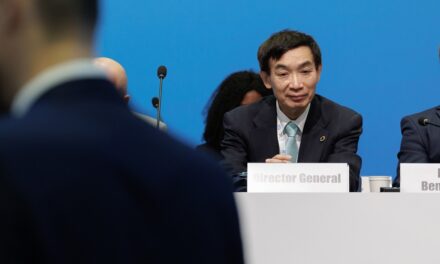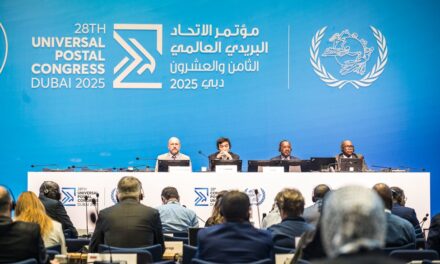
An overview of the 2008 UPU Congress
Charles Prescott, Chairman UPU Consultative Committee and Vice President US Direct Marketing Association. World Mail Review November 2008 The Congress Meets Every Four Years
On a warm and sunny July 23 in Geneva, the 24th Universal Postal Congress opened for business. Styled the “Nairobi Congress” the quadrennial event was originally scheduled to take place in Nairobi, but had to be moved to a new location due to the civil disturbances in that country at the beginning of 2008. Over the course of three weeks the UPU’s membership of 191 countries, of which 179 were in attendance, chose to continue with many of its traditions and objectives, expanded the scope and breadth of many of its programs, and reached for new efficiencies and disciplines.
During this Congress involving some 2,500 ministers, postmasters general, international relations experts and postal operations professionals, it became clear that the postal systems of the world are on two different tracks. The two tracks overlap and at times conflict, as will become clearer later in this article.
Opening Debates
A UPU Congress begins, as did this one, with something called the General Debate, a day’s presentation of the views of UN agency experts and officials, as well as speakers from the private sector. They helped the audience focus on the current major themes that guide UN agency efforts and the private sector across all industries and disciplines.
The World Trade Organization, for example, stressed the role that the network infrastructure of the postal system plays in international trade. A similar theme was struck by the International Monetary Fund and other speakers who noted the hundreds of millions of migrants worldwide who look to the post and other systems to support their families at home.
The environment was much on the minds of speakers in the general debate, as well as posts throughout the congress. The United Nations Environment Program and the UPU announced a partnership to help the postal system to measure its carbon footprint and make recommendations on how it can be reduced. Its director, Achim Steiner, invited the postal sector to take part in a worldwide awareness campaign on environmental challenges.
Focus on Quality of Service
The following days and weeks of the Congress saw the approval of work projects and structures that will engage the world’s postal systems at the UPU for the next four years, as well as a raft of decisions on the routine inner workings of the many aspects of international mail traffic.
Among these projects is an expansion of the global monitoring system which measures quality of service between and among postal operators. It is surprising to note that the apparently simple process of deploying measurement gates and RFID chips in samples of letters between postal systems can be as expensive as it is. It is, nevertheless, an indication of the commitment of the postal operators to measure speed and reliability between them that they have committed to the expense. In the international field, targets have been set at J+5 for 65% of priority mail traffic, and the last set of report cards showed that nearly all postal systems outside Europe and North America were falling well short of these targets. An improvement up to the target can only be good for direct marketers.
This and many other programs being carried out by the UPU are extraordinarily expensive. The budget of the UPU will be set by the Council of Administration in November 2008, but in 2007/8 the UPU spent approximately US$31m (against member revenues of $32m), which is only 75% of the budget of, for example, the US Direct Marketing Association. However, more and more of the UPU’s activities are self funded either through the revenues of the activity, such as the Postal Technology Center, Telematics and EMS, or through voluntary donations. For example, delegates at this Congress approved the previous ad hoc arrangement of countries such as France and Spain making extra budgetary donations to the UPU’s programs, sometimes with targeted donations for specific programs and sometimes in “untied” funds. In addition, there are cooperative programs which are sponsored by their members. These include the International Financial Services system (electronic money orders) and EMS ( Express Mail Service) whose operations are staffed and housed in the UPU.
Tensions Between the Developed and Developing Countries
The acceptance and expansion of a program to reach out to the private sector to engage in the cooperative development and funding of programs for the international postal system is now approved by the membership. This acknowledgement by the UPU membership that development may also come through partnership with the private sector, and that postal services are part of a market, has been eight years in coming.
For someone from the developed world, this sounds like an exercise in stating the obvious. However, there is a major underlying sense that the two thirds of the UPU membership from the developing world do not see postal services as part of “the market”, but a governmental function. Interventions by countries such as Iran, Nigeria, El Salvador, and most of Sub-Saharan Africa reflected developing countries’ views that the industrialized world has an obligation to assist them in their development, that private business is not to be trusted, and that they do not share a belief in the benefits of working with private business on development projects. Thus, the approval of public/private partnerships as an acceptable policy for the UPU is somewhat dramatic.
In most debates and discussions in the UPU, there was generally a tension between the developing countries’ desire for the UPU to have a powerful developmental role and the views of the more developed countries that it should limit its activities to maintaining the international postal network.
This difference was starkly demonstrated in the debate over a Russian proposal to change the mission statement of the UPU to acknowledge that part of its mission is to promote trade and economic development within the member countries. Currently, the mission statement is to promote the international postal network. This proposal was strongly opposed by the United States, Norway, and many others. It was strongly supported by the developing world.
The speakers opposed stressed the fear of “mission creep” into an economic developmental role. This may also reflect a liberalized postal world’s view that in time there will not be much international postal traffic, or at least not enough to justify the continuation of the UPU, and a sense that there were in any event other more qualified UN agencies engaged in this sort of work. The proposal, which required a two thirds majority for adoption, failed by a handful of votes. This issue will not go away, as the actual approved activities of the UPU do indeed go beyond management of international parcel and letter traffic.
Another example of this developed/developing tension is the International Financial System project, which was re-funded. The United States, under pressure from the financial services sector in the US, opposed the UPU having a developmental role in assisting posts to develop other financial services products beyond money orders. This time, only a majority being needed, the US lost. The international financial services system set up four years ago is expanding at a significant rate and a number of countries announced their intention to join during the meeting, including Egypt, Jordan, Morocco, Qatar, Syria, Tunisia, UAE, and Yemen. Just previous to the Congress, Chile, Spain and Uruguay announced that they were joining. This observer is firmly of the view that the US has a moral obligation to participate since it is one of the largest sources of immigrant funds transfers.
Adoption of a Four Year Strategy
The UPU adopted unanimously its four year roadmap, the Nairobi Postal Strategy, which comprises four objectives that the members will strive to achieve before 2012. The four part program calls for improving interoperability, quality and efficiency of the postal network; the stimulation of the universal postal service and integrating it into social, economic, and technological environments; promoting sustainable development of the postal sector and its economy; and fostering the growth of postal markets and services.
This “new” strategy is much more detailed than the previous Bucharest strategy and is focused on eighteen concrete programs. In addition, the strategy calls for implementation on a regional basis using indicators of success and report cards that will issued annually or bi-annually. This new discipline will help identify achievements and shortcomings that can be monitored and addressed on an ongoing basis. The adoption of this very self disciplined and business like methodology was one of the goals of the leaders of the strategic planning group. Long term it will have powerful impact on the UPU and its member countries.
The wisdom of undertaking these activities on a regional basis becomes even more self evident and necessary when one looks at the last round of quality of service measurements where there were stark differences among the different regions.
Also of interest to the development of postal services worldwide is the continued approval of the Quality of Service Fund, which is extended to 2016. This fund was created in 1999 at the Beijing Congress and is funded by a form of surcharge on terminal dues paid from developed countries to less developed countries. Developing countries can apply to use these funds for projects which will improve the quality of service in international traffic. In the first eight years of the fund, nearly four hundred projects were approved worth approximately US$60m and which have benefited more than 150 postal operators.
Leadership
Lastly, the leadership. Elected to second four year terms were France’s Edouard Dayan, Director General, and the Deputy Director General, China’s Huang Guozhong.
In a bit of a surprise, the CEO of the Greek Postal Operator, Elta, Dr. Andreas Taprantzis was elected Chair of the Postal Operations Council, beating Swiss and British candidates. Most delegates had not known Dr. Taprantzis, as he was not much of a presence at the UPU during the last four year cycle, nor was Greece active on any major committees. Nevertheless, in conducting his first sessions of the POC, when committee leaderships were chosen, Dr Taprantzis demonstrated a firm and diplomatic control of the meeting.
The Consultative Committee, just referred to, is open to the wider postal sector in order that it may participate in the deliberations and activities of the UPU. It now consists of 19 members ranging from philately to financial services to express carriers. The Committee elected to a second four year term Charles Prescott, Vice President of the DMA as Chairman, with Murray Buchanan of Royal Mail as Vice Chairman.
If one project exemplifies the spirit and purpose of the UPU’s strategy more than any other, it is the global addressing project of the Consultative Committee. The Committee has announced that it will work closely with the Addressing Group of the UPU to promote the establishment and accessibility of change of address services by all posts worldwide, with a vision of there being one consolidated delivery point database managed through the UPU and accessible to mailers everywhere. The benefits to mailers, posts, and the environment are absolutely not at issue. One high point of its work will be a Global Addressing Summit tentatively scheduled for Fall 2009.












